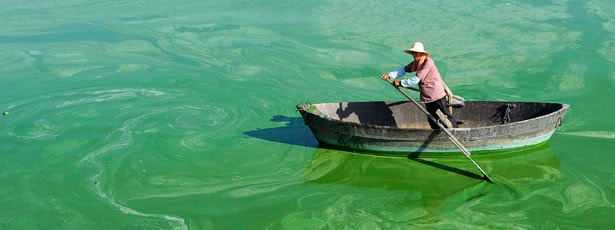Cyanobacteria
Cyanobacteria
Cyanobacteria,
also known as blue green algae are unicellular bacteria that obtain energy from
photosynthesis and produces oxygen to support life on earth. They are
prokaryotic organisms and have single membrane that capsules Protein, DNA and
Mitochondria, except the fact that some species have folds on the external
membranes which contain the photosynthesis mechanism. These folds in the
external membrane are called thylacoids.
Cyanobacteria have a bluish appearance which they obtain from a pigment named
as phycocyanin. This blue colored
pigment is used to capture light for photosynthesis.
Cyanobacteria break
the water molecule into oxygen, proton and electron through photosynthesis. The
electron so produced is used as energy source and oxygen is released as
byproduct. Many species of cyanobacteria are also able to reduce nitrogen and
carbon dioxide under aerobic conditions.
They are found in
almost all aquatic ecosystems of the world and are also found in other group of
organisms such as lichens, corals, etc. in the form of symbionts.
Cyanobacteria have
played a very important role in the evolution of life on earth as they are the
first ever organisms to carry out the process of photosynthesis and produce the
life supporting oxygen. The most of free oxygen present on earth is a result of
photosynthesis by early cyanobacteria. Endosymbiotic
theory explains that chloroplast present in plants and green algae have evolved
from cyanobacteria by the process of endosymbiosis.
In this way, cyanobacteria have laid the foundation of life on earth.
Credits: Image Source- Google Images
Credits: Image Source- Google Images



.jpg)
Comments
Post a Comment